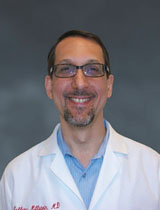Takeaway
Like learning to play jazz, medical interviewing skills can grow and develop through close observation and imitation of mentors.

Lifelong Learning in Clinical Excellence | September 12, 2022 | 2 min read
By Jeffrey Millstein, MD, Penn Medicine
“Man, sometimes it takes you a long time to sound like yourself.”-Miles Davis
During a recent session in the office, I shared some of my favorite patient interview phrases with my medical student. The phrases, “Tell me more,” “I wish . . .” and “What are you most worried could be wrong,” among many others, have helped me build rapport, navigate challenges and, most of all, enjoy interacting with patients. I encouraged my student to carefully observe the way experienced clinicians conduct interviews and keep a journal of effective verbal and non-verbal expressions they use. While the standard medical history template is a great starting point, a truly productive and satisfying interview comes when we layer on selections from a well-honed vocabulary of listening and conversation-enriching behaviors.
This process of imitation and gradually incorporating impactful statements and gestures is similar to the way jazz musicians learn to improvise. In one of my earliest memories of learning to play jazz, I’m sitting at the piano in a college practice room, trying to improvise over a pre-recorded rhythm section (guitar, bass, and drums) playing through the harmonic progression to one of my favorite jazz standards, “All The Things You Are.” My solo is like a tentatively stitched patchwork sound-quilt quoted from dozens of renditions of this tune that I’d listened to over and over again for months. There’s a Sonny Stitt line I love, a few little Charlie Parker patterns, and a measure or two I transcribed from a Miles Davis album. Analyzing and imitating these “licks,” or short melodic phrases, is teaching me to gradually construct my own jazz style.
Many argue that the medical interview is the most important part of doctoring. I wasn’t as intentional about observing excellent interview skills until a few years back when one of my colleagues offered an interactive seminar on relational communication. Watching my colleague and other facilitators role play and then giving it a try myself was the beginning of my “jazz” education in medical interviewing. It has made all the difference.
Think of the patient interview as an art form. Great rewards come from:
1. Adhering to a thorough framework.
2. Observing, imitating, and adapting the inspiring techniques of mentors into your own “sound.”
3. Presence, curiosity, and practice.
“Man, sometimes it takes you a long time to sound like yourself.”-Miles Davis
This piece expresses the views solely of the author. It does not necessarily represent the views of any organization, including Johns Hopkins Medicine.

